In the chill of winter, pondering what is a tire chain tensioner in winter driving safety? It’s a key player in your car’s winter armour. Snow chain tensioners provide essential grip and stability. Let’s explore their critical role in your winter drives.
Tire chain tensioners are essential components for vehicles driving in snowy or icy conditions; they play a crucial role in maintaining the effectiveness and safety of tire chains. These devices, often overlooked, are pivotal in ensuring that your journey through winter landscapes is not only smooth but also secure.
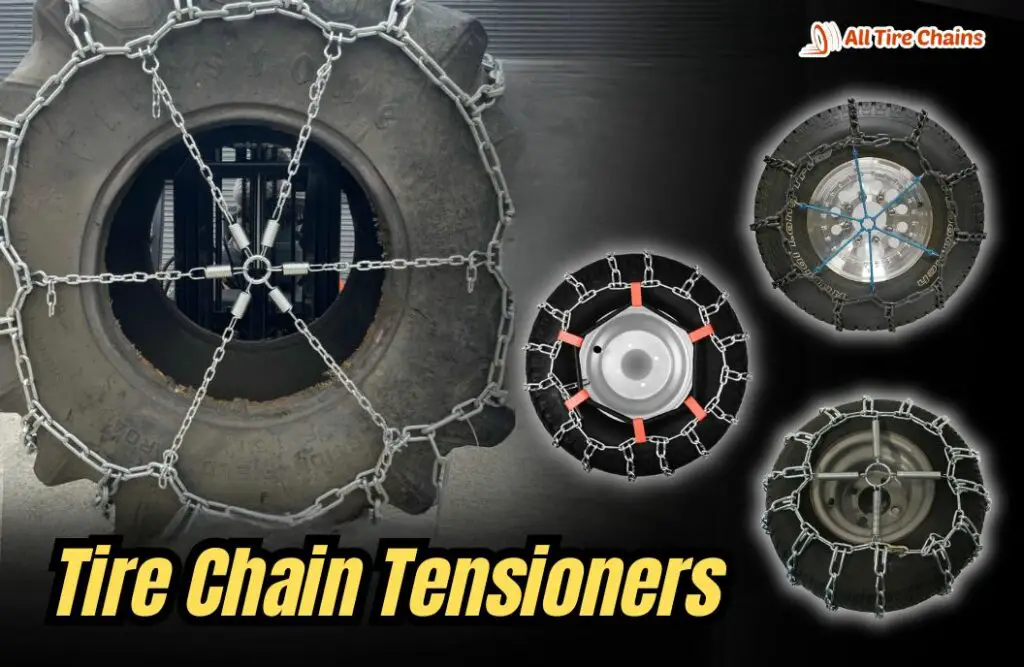
Understanding tire chain tensioners is the first step towards appreciating their importance in winter driving. So, what is a tire chain tensioner for winter driving?
A tire chain tensioner is a device that maintains the correct tension on tire chains, ensuring they fit snugly against the tire. This prevents slippage and misalignment, crucial for safe driving on icy or snowy roads. It’s a key component in winter road safety, adapting to various tire sizes and chain types.
In a Hurry? Here are our top choices and the best snow chain tensioners on the market right now:
Last update on 2024-05-19 / Affiliate links / Images from Amazon Product Advertising API
This tight fit is crucial because loose chains can lead to decreased traction, increased tire wear, and even the risk of the chains coming off entirely. Using a tire chain tensioner for safety on winter roads is not just a recommendation; it’s a necessity for responsible driving.
What is a Tire Chain Tensioner?
A tire chain tensioner is a device used to maintain the proper tension of tire chains, ensuring they remain snug and effective on the tire’s surface. But what is the purpose of the chain tensioner? Simply put, it’s to prevent the chains from slipping or becoming loose, which can be hazardous during winter driving.
What is a tire chain tensioner and why you need it for winter driving becomes clear when you consider the challenging conditions of icy roads. The tensioner ensures that the chains provide the necessary grip and stability.
There are various types of tensioners, such as snow chain tensioners, heavy duty tire chain tensioner, tractor tire chain tensioner, and others, each designed for specific vehicle types and tire sizes. The best tire chain tensioner for your vehicle depends on several factors, including the type of tire chains you use and the conditions you expect to encounter.
How Does a Tire Chain Tensioner Work?
The design and operation of tire chain tensioners are based on principles that ensure consistent tension and alignment. How tire chain tensioner works involves a mechanism that applies just enough force to keep the chains taut against the tire. This mechanism varies among different models but generally includes springs, ratchets, or rubber elements that adjust to maintain tension.
The mechanics of tire chain tensioners are ingeniously simple yet highly effective. They compensate for any slack that might develop in the chains due to movement or changes in tire size (like when air pressure fluctuates). This adaptability is crucial for maintaining optimal performance of the tire chains, ensuring they don’t become too tight or too loose.
A well-functioning tensioner not only enhances safety but also prolongs the life of both the tire chains and the tires themselves by ensuring even wear and tear.
Different Types of Tire Chain Tensioners
Various types of tensioners are available, each suited to different tire sizes and chain styles. Understanding the types of tire chain tensioners is crucial for selecting the right one for your vehicle. The different tire chain tensioner types cater to various needs, ranging from light passenger cars to heavy-duty trucks, and are designed to work under diverse winter driving conditions.
Rubber Tire Chain Tensioners
Rubber tire chain tensioners, often resembling a rubber ring, are simple yet effective. They are stretched over the tire chain to provide tension. These rubber ring tire chain tensioner types are popular due to their durability and ease of use, making them a practical choice for light to moderate snow conditions.
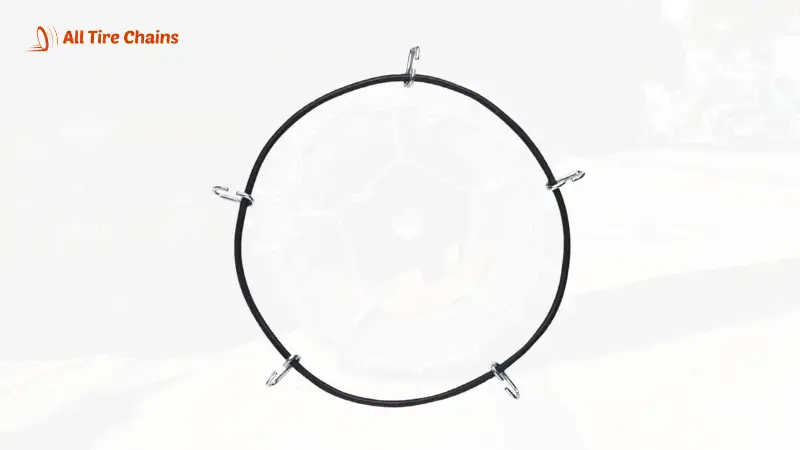
Spring-Loaded Tire Chain Tensioners
Spring-loaded tire chain tensioner systems use springs to automatically adjust tension. They are ideal for maintaining consistent pressure on the chains, ensuring optimal performance. These tensioners are particularly useful in fluctuating temperatures where chain slack might be a concern.
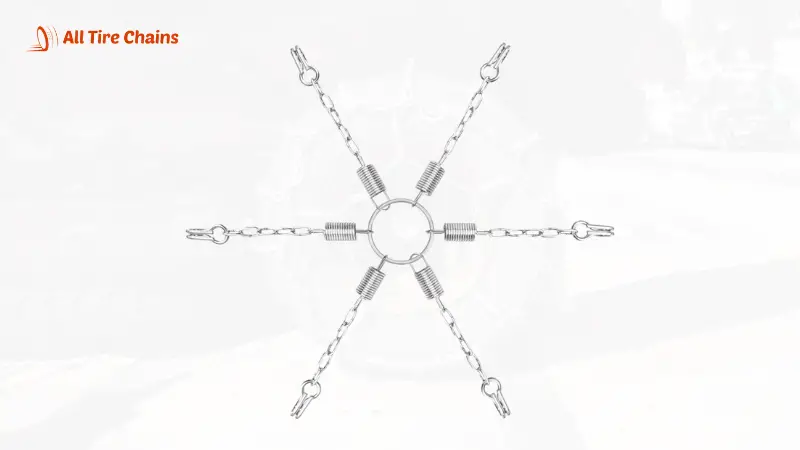
Bungee Cord Tire Chain Tensioners
Bungee cord models, or spider bungee tire chain tensioner, use elastic cords to secure the chains. They are quick to install and adjust, making them a convenient option for drivers who frequently encounter varying snow conditions.
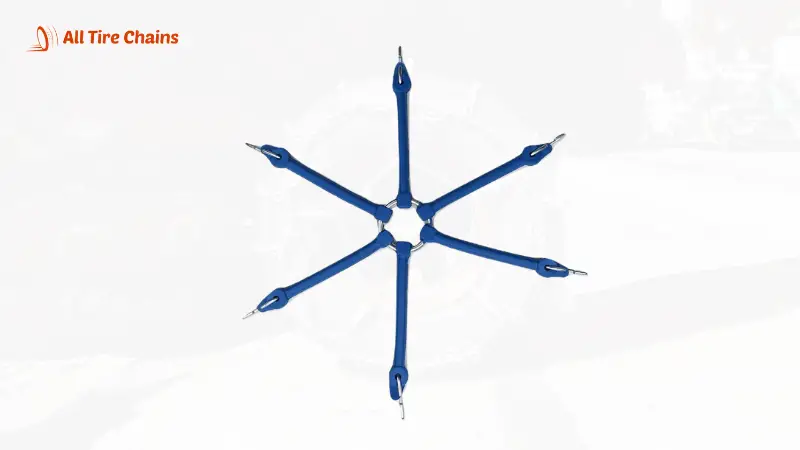
Cam Tire Chain Tensioners
Cam tensioners are a more advanced type, often raising the question: do cam style tire chains need tensioner? Yes, they do, as the cam mechanism allows for precise adjustment, ensuring the chains fit perfectly to the tire for enhanced grip and stability.
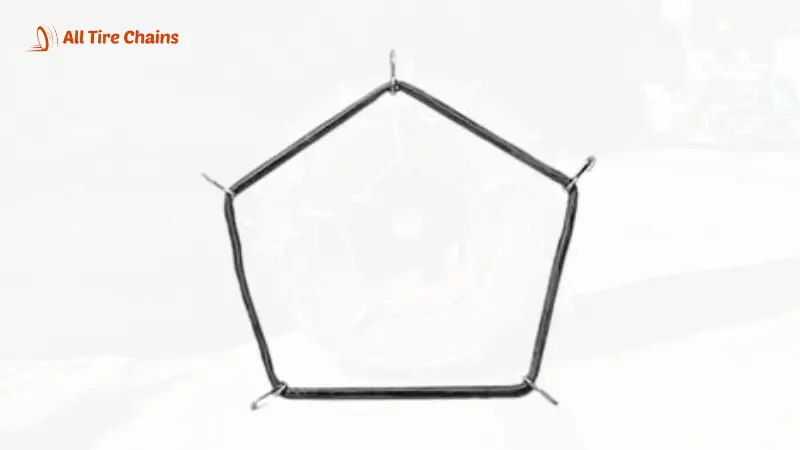
Twist Link Tire Chain Tensioners
Twist link tensioners are designed for heavy-duty applications. They provide robust tensioning capabilities, making them suitable for larger vehicles or extreme winter conditions. Their sturdy design ensures that the chains stay in place, even under strenuous driving scenarios.
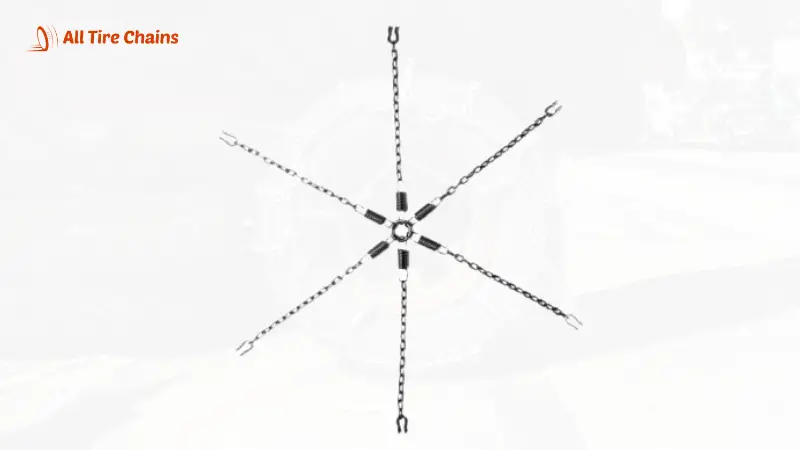
Here’s a quick table for you summarizing the different types of tire chain tensioners for cars, SUVs, pickup trucks, tractor, ATV etc. and their key features:
| Type of Tensioner | Key Features |
|---|---|
| Rubber Tire Chain Tensioners | Resemble rubber rings, durable, easy to use, good for light to moderate snow. |
| Spring-Loaded Tire Chain Tensioners | Use springs to automatically adjust tension, maintain consistent pressure, ideal for fluctuating temperatures. |
| Bungee Cord Tire Chain Tensioners | Elastic cords secure the chains, quick to install and adjust, convenient for varying conditions. |
| Cam Tire Chain Tensioners | Advanced with a cam mechanism for precise adjustment, ensures perfect fit for enhanced grip and stability. |
| Twist Link Tire Chain Tensioners | Designed for heavy-duty use, robust tensioning capabilities, suitable for larger vehicles or extreme conditions. |
Each of these tensioners plays a vital role in what is a tire chain tensioner in winter driving safety, offering different benefits to suit various needs and preferences. Selecting the right type ensures that your tire chains perform at their best, keeping you safe on winter roads.
Must check: Top 13 Best Tire Chains for Pickup Trucks: Expert Picks
Benefits of Using Tire Chain Tensioners
Using tire chain tensioners offers several benefits, including improved safety, extended lifespan of tire chains, and better vehicle control. These benefits are not just limited to cars but extend to various vehicles, highlighting the benefits of using tire chain tensioners across different contexts.
Whether it’s for a heavy-duty farm tractor or a lightweight ATV, the right tensioner can make a significant difference in performance and safety.
Safety Enhancements
Tire chain tensioners significantly enhance vehicle safety by ensuring chains do not slip or break. This aspect is crucial, especially in severe weather conditions where tire grip is paramount. Tire chain tensioner safety tips often emphasize the importance of proper tension to prevent accidents caused by chain failure.
Whether you’re driving a regular car or using farm tractor tire chain tensioners, ensuring that your chains are securely fastened with a reliable tensioner is a key safety practice.
Prolonging Tire Chain Life
Consistent tension provided by tensioners can extend the life of tire chains, making them a cost-effective investment. This is particularly true for different types of tire chain tensioners, each designed to optimize the lifespan of chains according to specific vehicle needs.
For instance, best tractor tire chain tensioners are engineered to withstand the heavy usage typical of agricultural settings, thereby prolonging the chain’s usability.
Improved Driving Experience
With tensioners, drivers experience smoother rides and better control, even in adverse weather conditions. This improvement is noticeable across various vehicle types, from lawn tractor tire chain tensioners to ATV tire chain tensioner systems.
The enhanced stability and grip provided by well-tensioned chains translate into a more comfortable and controlled driving experience, regardless of the terrain.
Ease of Installation
Tire chain tensioners simplify the installation process of tire chains, making it quicker and more efficient. This ease of installation is a key feature of how to install tire chain tensioner systems, which are designed to be user-friendly.
Whether it’s a garden tractor tire chain tensioner or a standard car chain tensioner, the simplicity of setting them up means less time in the cold and more time on the road.
Reduced Wear and Tear on Tires
By maintaining optimal tension, tensioners help in reducing the wear and tear on tires caused by loose or improperly fitted chains. This aspect is crucial in understanding what is a tire chain tensioner and why you need it.
Proper tension ensures that the chains do not damage the tires, thereby preserving the tire’s integrity and prolonging its life. This is particularly beneficial for vehicles that frequently traverse challenging terrains, such as tractors or ATVs, where tire health is paramount.
Must check: 14 Different Types of Tractor Tire Chains and Their Uses
How to Choose the Right Tire Chain Tensioner
Selecting the appropriate snow chain tensioner is crucial and depends on various factors like tire size, chain type, and vehicle model. Choosing the right tire chain tensioner involves understanding your specific needs and the conditions you’ll be driving in.
The right tensioner not only improves tire chain performance but also ensures tire chain safety under winter driving conditions.
Compatibility with Tire Size and Chain Type
It’s essential to match the tensioner with the tire size and type of chain for optimal performance. Tire chain tensioner compatibility is key to ensuring that the chains fit snugly without being overly tight or too loose.
Tire chain sizing plays a significant role in this, as a mismatch can lead to poor performance or damage to the tire. Whether you’re considering self-tensioning tire chains or other tire chain tensioner types, always ensure they are compatible with your tire size and chain type.
Considerations for Different Vehicle Models
Different vehicles have unique requirements for tensioners, influenced by factors like clearance and tire dimensions. Vehicle compatibility is a critical aspect of tire chain tensioner selection. For instance, a tensioner suitable for a small passenger car might not be appropriate for a larger SUV or truck.
Consider the specific requirements of your vehicle, including the available space around the tires, to ensure you choose a tensioner that fits correctly and functions effectively.
Assessing Tensioner Material and Durability
The material and build quality of a tensioner are critical for ensuring its durability and effectiveness in harsh conditions. When considering tire chain tensioner maintenance, it’s important to choose a tensioner made from materials that can withstand extreme cold and resist corrosion.
The durability of your tensioner directly impacts its longevity and the safety it provides. Whether you opt for a DIY tire chain tensioner, a homemade tire chain tensioner, or a commercially available one, the material quality should not be compromised.
Understanding Tensioner Adjustability and Flexibility
A tensioner’s adjustability and flexibility are important for accommodating different tire sizes and ensuring easy handling. How big should a tire chain tensioner be? It should be adjustable enough to fit your specific tire size while providing the right amount of tension.
Flexible tensioners can adapt to various tire sizes, making them a versatile choice if you have multiple vehicles. Additionally, consider the ease of tire chain tensioner installation and whether the tensioner allows for quick adjustments, which can be crucial in changing weather conditions.
Must check: 10 Easiest Tire Chains to Install for Hassle-Free Winter Drives
Installation and Maintenance of Tire Chain Tensioners
Proper installation and regular maintenance of tire chain tensioners are key to ensuring their effectiveness and longevity. Understanding how to install and use tire chain tensioners is not just about following instructions; it’s about ensuring winter driving safety. Regular upkeep, guided by tips for maintaining tire chain tensioners, plays a crucial role in their performance.
Step-by-Step Installation Guide
Installing tire chain tensioners correctly is straightforward if you follow these steps. The process of installing a tire chain tensioner involves several key steps, each critical to ensure that the tensioner functions as intended.
Tire chain tensioner installation is a simple yet vital task that enhances the effectiveness of your tire chains. Remember, do I need a tensioner for tire chains? Absolutely, to maintain optimal tension and safety.
Step 1: Lay the chains flat near the tires – Ensure no tangles or twists for smooth tire chain tensioner adjustment.
Step 2: Drape chains over the tire, ensuring even distribution – This step is crucial for balanced tension and effective chain function.
Step 3: Connect the chain links at the back of the tire – Secure them tightly to avoid slippage or gaps.
Step 4: Attach the tensioner to the chains as instructed – Follow the manufacturer’s guide for correct tire chain tighteners placement.
Step 5: Adjust tensioner until chains are snug and secure – Proper adjustment is key to what does a tire chain tensioner do effectively.
Step 6: Double-check all connections and adjustments – Ensuring everything is secure is essential for tire chain tensioner tips and tricks.
Each step in this process is designed to maximize the efficiency and safety of your tire chains, contributing significantly to your overall winter driving experience.
To further enhance your understanding of installing tire chain tensioner on larger vehicles, watch this practical demonstration by TireChainCom. This video, titled “Large Tractor Spring Tensioner Installation,” specifically focuses on farm tractor tire chain tensioners, offering valuable insights for a seamless installation process.
Maintenance Tips for Longevity
Regular maintenance of tensioners can significantly extend their lifespan and ensure consistent performance. Just like any other component of your vehicle, tire chain tensioner maintenance is crucial for optimal functionality and safety. This involves routine checks and care, ensuring that each tensioner is in good condition and ready for use.
Proper maintenance not only enhances tire chain tensioner safety but also saves you from potential hazards and unexpected breakdowns. Here are seven essential maintenance tips to keep your tire chain tensioners in top shape:
- Tire Chain Tensioner Inspection: Regularly inspect tensioners for any signs of wear, damage, or corrosion. This helps in identifying issues before they become major problems.
- Cleaning Tire Chain Tensioner: Keep tensioners clean from dirt, grime, and rust. A clean tensioner functions more efficiently and lasts longer.
- Lubricate Moving Parts: Apply lubricant to any moving parts to ensure smooth operation and prevent rusting, especially after exposure to moisture.
- Check for Proper Fit: Regularly ensure that the tensioner fits correctly and is not too loose or tight, as improper fit can lead to damage.
- Tire Chain Tensioner Removal: Remove tensioners when not in use, especially in non-winter months, to reduce unnecessary strain and wear.
- Store in a Dry Place: When not in use, store tensioners in a dry and cool place to prevent rust and degradation.
- Replace When Necessary: Don’t hesitate to replace tensioners that show significant wear or damage. Using worn-out tensioners can compromise your safety.
By following these maintenance tips, you can ensure that your tire chain tensioners remain reliable and effective, providing you with peace of mind during winter driving conditions.
Must check: 13 Best Snow Chains for 4×4 Trucks: The Ultimate Guide
Common Chain Tensioner Challenges and Solutions
While tire chain tensioners are generally reliable, users may encounter certain challenges, for which there are effective solutions. From tractor tire chains tensioners to ATV tire chain tensioners, each type can present unique issues. Understanding how to apply tire chain tensioners correctly and addressing problems as they arise is key to maintaining their functionality.
Whether you’re looking for the best tire chain tensioners or considering how to make your own tire chain tensioners, being aware of common challenges and their solutions is crucial.
Troubleshooting Common Issues
Understanding how to troubleshoot common issues with tensioners can save time and ensure safety. One of the first steps in troubleshooting common tire chain tensioner problems is to check for correct installation.
Improperly installed tensioners can lead to slippage or damage to the tire chains. If you’re using ATV tire chain tensioners, ensure they’re suited for the smaller tire size and unique ATV chain design.
Another common issue is tensioners becoming too tight or too loose. This can be resolved by regularly checking and adjusting the tension. For those wondering what is a tire chain tensioner and how does it work, it’s a device that maintains the right amount of tension on your tire chains, crucial for effective performance.
If a tensioner is damaged or worn out, it’s important to replace it immediately to maintain safety and efficiency.
Professional vs. DIY Solutions
Some problems may require professional assistance, while others can be handled with DIY approaches. For complex issues, especially with specialized tensioners like those for tractors, seeking professional help is advisable. However, for simpler problems or for those with a bit of mechanical know-how, DIY tire chain tensioner solutions can be effective and cost-efficient.
If you’re considering where to buy tire chain tensioners, it’s important to choose reputable suppliers who offer quality products and advice. For those inclined towards DIY, there are resources available on how to make your own tire chain tensioners. These can be particularly useful for custom or unusual tire sizes where standard tensioners may not fit properly.
Whether you choose a professional or DIY route, the key is to ensure that your tire chain tensioners are always in good working condition to guarantee safety and optimal performance in challenging driving conditions.
Must check: Are Snow Chains Better Than Snow Tires for Winter Traction?
What are the Best Tire Chain Tensioners for Different Types of Vehicles? [FAQs]
This section addresses frequently asked questions about tire chain tensioners, providing concise and informative answers. Whether you’re curious about what is the best tire chain tensioner or how to use tire chain tensioners, these FAQs cover a range of topics to enhance your understanding and use of these essential winter driving tools.
How often should tire chain tensioners be replaced?
Tire chain tensioners should be inspected regularly and replaced if they show signs of wear or damage. The lifespan of a tensioner can vary based on usage and maintenance. For those using snow tire chain tensioners or best tractor tire chain tensioner, it’s crucial to check them each season.
Factors like the tensioner’s material, the severity of use, and storage conditions can affect their durability. Generally, replacing tensioners every few years or as needed is a good practice. Always consult the manufacturer’s guidelines for specific recommendations.
Can tire chain tensioners be used on all types of vehicles?
Most tire chain tensioners are versatile and can be used on a variety of vehicles, including passenger cars, trucks, and tractors. However, it’s important to ensure tire chain tensioner compatibility with your vehicle’s tire size and chain type. Truck tire chain tensioner requirements might differ from those for smaller vehicles.
When selecting tensioners, consider the specific needs of your vehicle, such as tire size and clearance. Always refer to the vehicle’s manual and the tensioner’s specifications to ensure a proper fit and safe operation.
Are there any legal restrictions on using tire chain tensioners?
Legal restrictions on using tire chain tensioners vary by region and country. In some areas, there are specific regulations regarding the use of tire chains and tensioners, especially in regions with severe winter conditions. It’s important to be aware of and comply with tire chain tensioner legal restrictions in your area.
These regulations are often in place for safety reasons and can dictate when and where tire chains and tensioners can be used. Check local laws and transportation guidelines to ensure compliance and avoid penalties.
How do tire chain tensioners affect fuel efficiency?
Tire chain tensioners can have a minor impact on fuel efficiency. The added weight and rolling resistance of tire chains can slightly increase fuel consumption. However, the use of tensioners helps to optimize the fit and efficiency of tire chains, potentially mitigating some of this impact.
Properly adjusted tensioners ensure that chains are not too tight or loose, which can help maintain tire chain tensioner fuel efficiency. While the effect on fuel economy is generally minimal, the safety benefits during winter driving conditions are significant.
Can I install tire chain tensioners myself, or do I need a professional?
Many drivers can install tire chain tensioners themselves, especially if they are familiar with their vehicle’s tire system. The process usually involves straightforward steps that can be accomplished with basic tools. However, if you are unsure or uncomfortable with the installation process, seeking tire chain tensioner professional installation is advisable.
This is particularly true for heavy-duty vehicles or specialized tire chains. Always follow the manufacturer’s instructions for how big should a tire chain tensioner be and how to install it correctly to ensure safety and effectiveness.
Final Thoughts: What is the Purpose of the Chain Tensioner?
In conclusion, tire chain tensioners are indispensable for drivers in winter conditions, offering enhanced safety and performance. They are a key component in ensuring that your journey through snowy and icy roads is as safe as possible. This guide has covered everything you need to know about tire chain tensioners, from their types and installation to maintenance and troubleshooting.
For those in harsh winter climates, investing in the best snow chain tensioners is a wise decision. Not only do they provide peace of mind, but they also significantly improve vehicle handling and safety. Using a tire chain tensioner for safety on winter roads is not just a recommendation; in many cases, it’s a necessity.
Whether you opt for a heavy duty tire chain tensioner or a standard model, the importance of these devices cannot be overstated. They are an essential part of what is a tire chain tensioner for winter driving safety, ensuring that your winter driving experience is as secure and efficient as possible. Remember, the right preparation and equipment can make all the difference in challenging winter conditions.
You’ll likely appreciate diving into:


